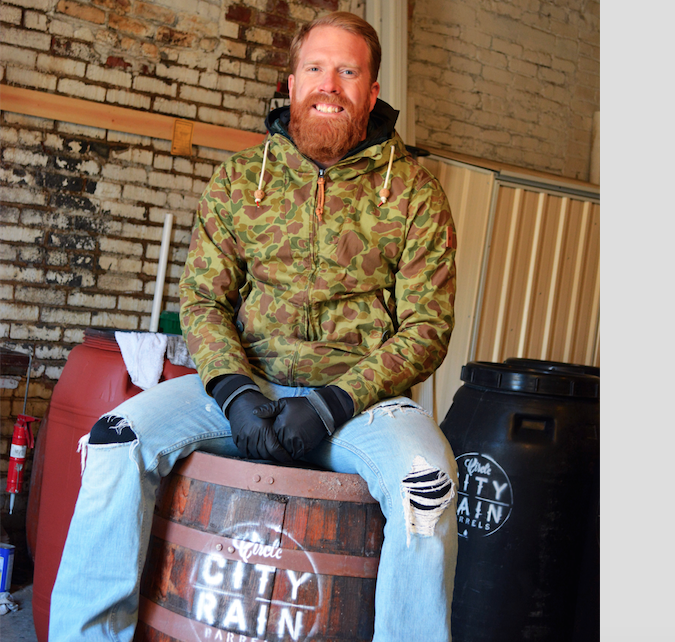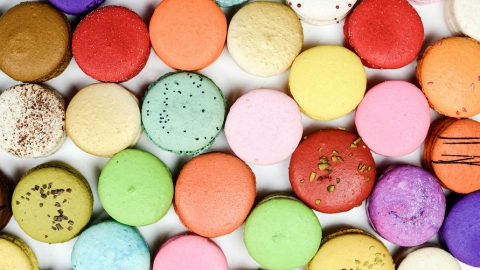Circle City Rain Barrels
Not so long ago, before commercial agricultural grew so large, rain barrels were a common fixture in family yards. Usually just a large receptacle that caught rainwater, people used them for gardens or even to provide water for animals, such as chickens. Andy Cochran, owner of Circle City Rain Barrels, would like to see that era return.
Cochran launched Circle City Rain Barrels in 2011 after coming to a crossroads in his life. Dissatisfied with his job at the time, he found himself drawn to the culture of the locally grown food movement.
“We are so disconnected from our food sources in this country,” he says, “and we are just getting back to being aware of where our food is actually grown.” After a stint of volunteering, he landed an apprenticeship at the Wishard Slow Food Garden at White River State Park.
While working at the garden, which is maintained by the nonprofit organization Growing Places Indy, he was intrigued by the use of rain barrels. He saw firsthand how important water management was to urban gardening and developed an appreciation for water preservation. During that time, Laura Henderson, founder of Growing Places Indy, and her husband, Tyler, were assembling rain barrels to be used at the garden and for purchase by other interested individuals. As their organization grew, the couple became too busy to continue the rain barrel operation. Cochran saw the need for a local rain barrel provider, seized the opportunity and Circle City Rain Barrels was born.
“I had an itch to create something on my own, but also a true passion for water conservation,” Cochran says. “We don’t have an endless supply of water, and we aren’t that smart about water usage—so why not save a gallon if we can?” He points out the rise of recycling: “It started out very small and look what it has grown into.”
The rain barrels of today are filled with rainwater diverted from house downspouts by a fill tube. A spigot is inserted into the containers along with an overflow valve to divert excess water away from the home. Water collected from rain barrels displaces hose usage and over time can decrease water bills. Collected rainwater can be used for gardens and house plants as well as washing cars. While unsuitable for human consumption, many people use it to wash their dogs in addition to filling up the pet’s water bowl. Cochran says, “Since it comes straight from the sky, the water doesn’t contain any harmful contaminants such as chlorine or other chemicals.”
The rain barrels that are offered by Circle City are undeniably more sophisticated than an old oil drum that might have been used in past years. Customers have several options ranging from a $40, 55-gallon plastic “Do It Yourself” model, all the way to a beautiful oak barrel that includes a platform and installation for $320. The plastic versions are upcycled food-grade containers Cochran obtains from Detroit and Ontario, but actually originate from Europe and India. Using food-grade plastic is important because it does not contain BPA (bisphenol A), a chemical that can leach into water.
When the company first began, its oak barrels came from Kentucky and had been used to hold bourbon. For the last year, they have come from two local microbreweries: Flat12 Bierwerks and Sun King Brewery. All the barrels are equipped with a lid and mosquito netting to keep out insects and leaves. For an extra cost, diverters can be installed as well. In cold weather, barrels are “winterized” by draining and drying them.
Cochran also runs workshops that educate the public on rain barrel use and how to install them. They have been sponsored by local businesses such as Pogue’s Run Grocer and Woodruff Place Flea Market, but he has also been hired to do “Barrel Parties” at private homes. Participants can personalize the plastic drums by painting them the color of their choice, while learning how using them helps the environment.
Someday Cochran would like to include a home and garden décor division and has already begun making lights and planters out of recycled metal barrel hoops. In fact, some local brides have discovered the lights are perfect for cottage-chic style weddings.
And it’s very important to him to spread the word about the significance of water conservation.
“Instead of always taking from the earth, we can work smarter,” he says. To this end, someday he hopes to be able to visit elementary schools and perhaps even develop plans to help large businesses decrease their use of conventional water sources.
To learn more about Cochran and his rain barrels, visit CircleCityRainBarrels.com.
[Contributor] Julie K. Yates is a freelance writer and food blogger. She enjoys sharing the stories of individuals who pursue culinary-related experiences. Visit her blogs at YatesYummies.com and OrangesAndAlmonds.com.





